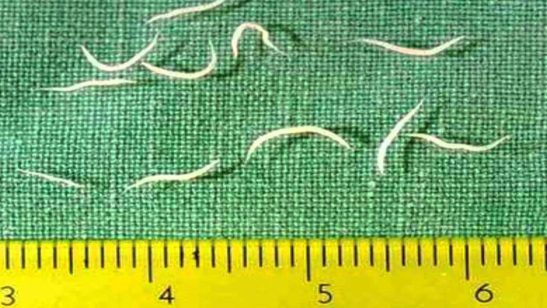Squirmin’ Worms

Enterobius, also known as pinworm or threadworm, is a pretty common intestinal worm in Australia – affecting about 40% of kids at some stage in their life. It takes about four weeks from the time someone ingests an egg until it hatches in the small intestines and grows to adult size – about 12mm long for females and 4mm long for males. The worms usually set up their colony in the small intestine, near the appendix.
At night, the female adult migrates out of the anus and lays her eggs on the skin of the edge of the anus, the eggs are not visible to the naked eye as they are five one hundredths of a millimetre long and are translucent. The worms don’t show up on regular poo tests; either the flashlight test or the sticky tape test can be done to prove (or disprove) that they are there.
The thousands of eggs deposited near the anus cause the skin to be itchy and when the fingers and fingernails are contaminated, it is easy to re-inoculate the person and start the life cycle all over again.(1) Pets don’t carry pinworms, and the spread of the worm is via the eggs, which can be ingested or inhaled. Once an egg is deposited on skin, clothing, bedding or other contaminated surfaces, it remains able to infect someone for about 2-3 weeks.(2)
Getting Enterobius could be considered a rite of passage, and probably has beneficial effects on the immune systems of children who have one or two simple infections early in life.
However, children with recurrent or chronic infections can be affected by restless sleeping, emotional difficulties, nightmares, night terrors, sleep talking, vulval itching or pain (in girls, of course) urinary tract infections and even appendicitis. Although common, an itchy bottom is not an essential feature, and about one third of the people who have pinworm will have no symptoms at all. (1)
Considering that issues such as inattention, irritability and poor short term memory can be a result of sleep disruption from chronic worm infections, it’s sensible to rule them out if a child is being assessed for developmental issues such as ADHD.
Treatment of uncomplicated pinworm/threadworm consists of over-the counter worming treatment, for the person and all of the household contacts. It is important to trim and scrub fingernails and get on top of hand-washing, nose-picking and nail biting.
Because the eggs are in the environment, daily morning showering, daily changing of underwear, and hot laundering (with regular detergent) night clothes, sheets, towels, soft toys and underwear after each treatment of the infected person, will reduce the chance of re-infection from an egg that is sitting on the bedding and surfaces of the room.
The over the counter worming preparation needs to be repeated, along with the house-cleaning and laundering within 10-14 days to catch the newly hatched worms (the medications don’t work on worm-eggs).(2)
If you have trouble eradicating the worms, or suspect the infection is not in the gut (and therefore won’t be susceptible to the over the counter treatments which are not well absorbed in to the bloodstream), then there are other things we can do to help you manage the infection.
Why do some kids get quite sick from the worms and others repel the infection easily? That, we don’t know for sure. As we are learning more and more about the gut though, I think that we will discover that a healthy gut will be better able to withstand attack by parasites.
A healthy gut is a result of a healthy diet, rich in abundant colourful vegetables, and nice amounts of good fats and protein containing foods. The gut-healthy diet avoids food processing agents like emulsifiers, thickening agents, sugars and white flours.(3)
Yet another reason to eat up those veggies!

Beautiful 1770.
References:
- Rawla P, Sharma S. Enterobius Vermicularis (Pinworm). In: StatPearls [Internet]. Treasure Island (FL): StatPearls Publishing; 2019 [cited 2019 Oct 30]. Available from: http://www.ncbi.nlm.nih.gov/books/NBK536974/
- Prevention C-C for DC and. CDC – Enterobiasis – General Information – Frequently Asked Questions [Internet]. 2019 [cited 2019 Oct 30]. Available from: https://www.cdc.gov/parasites/pinworm/gen_info/faqs.html
- Chassaing B, Wiele TV de, Bodt JD, Marzorati M, Gewirtz AT. Dietary emulsifiers directly alter human microbiota composition and gene expression ex vivo potentiating intestinal inflammation. Gut. 2017 Aug 1;66(8):1414–27.
